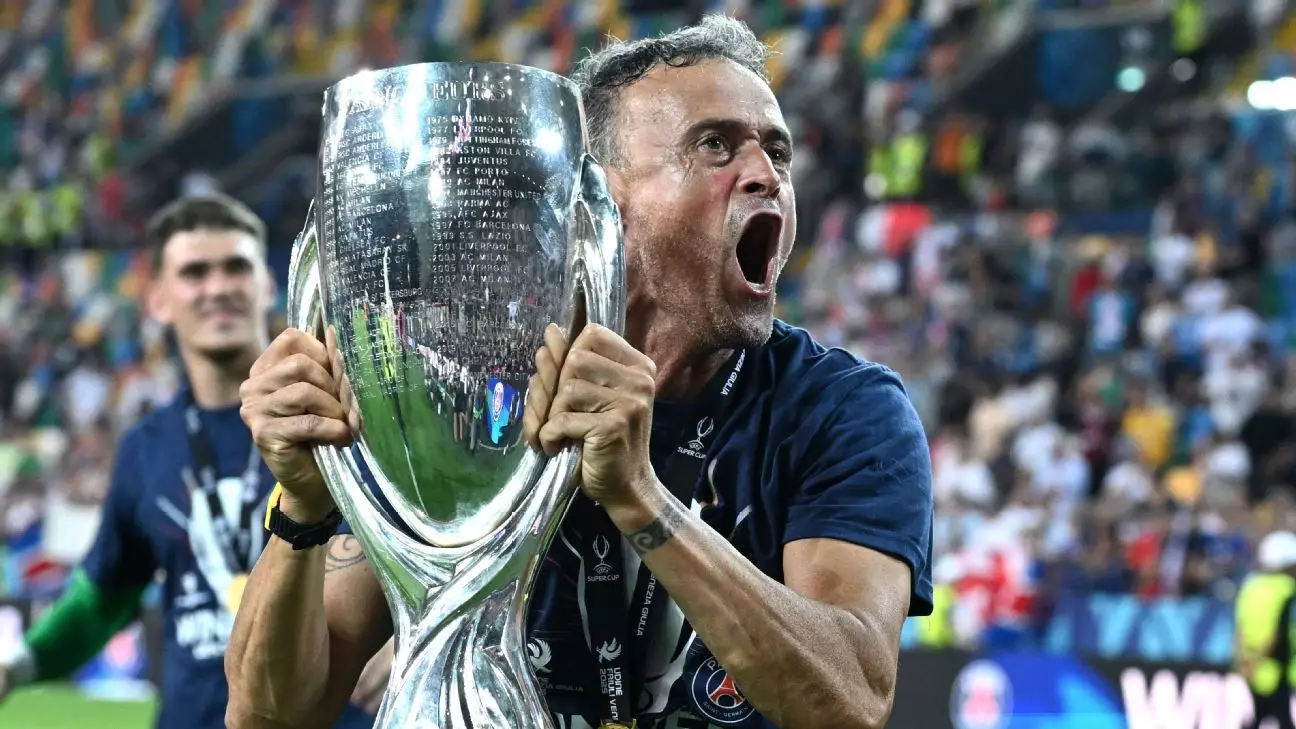The recent UEFA Super Cup encounter between Paris Saint-Germain and Tottenham Hotspur was not merely a contest of skill but a vivid illustration of the unpredictable nature of football and the importance of preparation. Luis Enrique’s admission that PSG “didn’t deserve” to win highlights a humility that is both admirable and questionable. His critique underscores a fundamental truth: physical readiness and tactical discipline often outweigh talent alone. Tottenham, having dedicated six weeks to rigorous training, seemed well-prepared, exhibiting sharpness and cohesion that PSG, hampered by a sparse six days of training following their Club World Cup run, could not match. This disparity laid bare the role of discipline and consistency in the crucible of high-stakes matches.
Enrique’s perspective hints at a broader debate within modern football—how much of victory is down to strategy versus pure physical conditioning? While PSG’s late rally underscores their fighting spirit, it also shines a light on their vulnerabilities. The Parisian side was clearly caught off-guard by Tottenham’s dominance for the majority of regulation time. Yet, the fact that they managed to scrape back from the brink after being two goals down encapsulates the chaotic beauty of football: moments of brilliance can emerge from resilience, even when the odds seem insurmountable.
The Debut Dilemmas and Leadership Vacuum
One of the more intriguing stories from the match was the debut of Lucas Chevalier, who stepped into the spotlight with a complex mix of heroism and error. The young goalkeeper’s initial misstep—palming a shot onto the crossbar—was an inadvertent gift to Tottenham but also a testament to the brutal learning curve faced by emerging talents. His subsequent save in the penalty shootout proved that resilience is as vital as talent in the crucible of high-pressure situations. Conversely, the absence of Gianluigi Donnarumma, PSG’s erstwhile star goalkeeper, raises questions about leadership and stability within the team.
Donnarumma’s decision to leave PSG and his apparent absence from the match spotlight are more than mere roster movements—they signal a shifting dynamic within the club. A goalkeeper of Donnarumma’s caliber, renowned for his composure and shot-stopping, often embodies the confidence of a team. His departure may unnerve some, but it opens the door for young players like Chevalier to develop their mental toughness. Enrique’s statement on Donnarumma’s “big personality” and the importance of maintaining a mental edge resonates deeply. It emphasizes that football at the elite level is as much about psychological resilience as it is about physical prowess.
The Future of PSG: A Balance Between Youth and Experience
This match underscores the ongoing challenge faced by PSG: balancing the infusion of youth with the stability of experienced leadership. The club’s investment in emerging talents like Chevalier and Gonçalo Ramos signals an intent to build a new legacy, but such a strategy is fraught with risks. The late-game heroics from Gaspar Ramos and Lee Kang-in highlight potential but also reveal vulnerabilities under pressure.
More critically, the decision to field a relatively underprepared squad raises concerns about the club’s wider strategic planning. Is PSG prioritizing quick success over sustainable development? The squad management and transfer decisions reflect a club in transition, trying to blend a winning mentality with a long-term vision. Enrique’s focus on mental toughness and his acknowledgment of the team’s short preparation time suggest that PSG may need to reassess its approach to training and match readiness. The emphasis on resilience and adaptability should be central to PSG’s evolution, particularly when competing against physically prepared and cohesive opponents like Tottenham.
The Broader Implications: Character, Strategy, and the Race for Dominance
Ultimately, PSG’s Super Cup clash was a microcosm of modern football’s complexities—where talent alone cannot guarantee victory. It is a game of contrasts: youth versus experience, tactical discipline versus spontaneity, resilience versus complacency. Enrique’s candid reflection on the team’s lack of deserved victory acts as a reminder that success is earned through preparation, focus, and mental toughness.
This match also sparks a debate about leadership and mindset within elite clubs. The absence of Donnarumma and PSG’s miraculous comeback in the final moments shed light on the importance of character. The ability to endure mistakes, recover quickly, and maintain fighting spirit defines the true essence of a champion team. In the years to come, PSG’s journey will hinge on their capacity to cultivate resilience from within their ranks—not just rely on star power or fleeting moments of brilliance.
As the football world watches PSG’s development, one thing remains clear: true strength lies in adaptability, mental fortitude, and strategic patience. Matches like this are not just tests of skill—they are tests of character. PSG’s ability to learn from adversity and build a resilient identity will determine whether they become perennial contenders or remain a fleeting force in European football’s ever-changing landscape.

